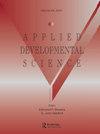课后参与:一种理解青少年参与概况的混合方法
IF 1.7
3区 心理学
Q3 PSYCHOLOGY, DEVELOPMENTAL
引用次数: 3
摘要
参与课外活动是研究人员和实践者越来越感兴趣的领域。尽管有一个新兴的研究机构在调查这一结构,但我们对参与的具体维度是如何在学生的子群体中以不同的方式得到认可的缺乏了解。人们对课外参与的来源和障碍知之甚少。这项混合方法的调查使用了潜在轮廓分析和半结构化的学生焦点小组,以定期参加课外活动的代表性不足的少数民族学生为样本,探索参与的个体差异以及参与的来源和障碍。潜在特征分析揭示了三种参与特征:适度参与、有效参与和不参与。报告的来源(例如,节目内容,朋友)和障碍(例如,人际关系紧张,重复内容)因个人资料而异。结果提供了学生参与课外活动的全面理解,并与希望促进参与的从业者相关。本文章由计算机程序翻译,如有差异,请以英文原文为准。
Afterschool engagement: a mixed methods approach to understanding profiles of youth engagement
Abstract Engagement in afterschool programs is a growing area of interest for both researchers and practitioners. Though there is an emerging body of research investigating this construct, we lack an understanding of how specific dimensions of engagement are endorsed in different ways among subgroups of students. Little is known about the sources and barriers of engagement in afterschool contexts. This mixed methods investigation used latent profile analysis and semi-structured student focus groups to explore individual differences in engagement and sources and barriers of engagement for a sample of underrepresented minority students who regularly participate in an afterschool program. Latent profile analyses revealed three engagement profiles: moderately engaged, affectively engaged, and disengaged. Reported sources (e.g., program content, friends) and barriers (e.g., interpersonal tension, repetitive content) differed by profile. The results provide a comprehensive understanding of student engagement in afterschool programs and are relevant to practitioners who desire to promote engagement.
求助全文
通过发布文献求助,成功后即可免费获取论文全文。
去求助
来源期刊

Applied Developmental Science
PSYCHOLOGY, DEVELOPMENTAL-
CiteScore
12.00
自引率
2.60%
发文量
23
期刊介绍:
The focus of this multidisciplinary journal is the synthesis of research and application to promote positive development across the life span and across the globe. The journal publishes research that generates descriptive and explanatory knowledge about dynamic and reciprocal person-environment interactions essential to informed public dialogue, social policy, and preventive and development optimizing interventions. This includes research relevant to the development of individuals and social systems across the life span -- including the wide range of familial, biological, societal, cultural, physical, ecological, political and historical settings of human development.
 求助内容:
求助内容: 应助结果提醒方式:
应助结果提醒方式:


